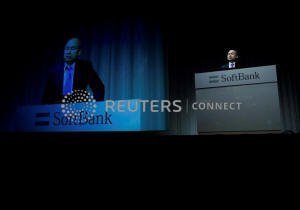SoftBank’s China strategy wobbles as key bets disappoint
 Send a link to a friend
Send a link to a friend
 [December 16, 2019] [December 16, 2019]
By Kane Wu, Julie Zhu and Yingzhi Yang
HONG KONG/BEIJING (Reuters) - For SoftBank Group Corp <9984.T>,
financial technology firm OneConnect's IPO should have been a
vindication of an aggressive China investing strategy.
Instead, embarrassed bankers had to slash the offering size and cut its
price as investors baulked at a business model seen too reliant on
majority owner Ping An Insurance <601318.SS>. The IPO valued OneConnect
at $3.7 billion, about half its worth last year when SoftBank's Vision
Fund invested $100 million, and its stock finished flat in its debut on
Friday.
OneConnect Financial Technology <OCFT.N> is just one of many China bets
placed by the Japanese investment giant or its massive Vision fund which
have run into trouble. That's added to global woes for SoftBank CEO
Masayoshi Son, under fire for bad judgement and insufficient due
diligence, exemplified by U.S. office-space startup WeWork's disastrous
IPO attempt and subsequent bailout.
In ZhongAn Online P&C Insurance Co Ltd's <6060.HK> 2017 IPO, for
example, SoftBank ploughed in $550 million as a cornerstone investor.
But the deal was seen by some investors as way overvalued and now trades
at about half its IPO price.

Its unlisted portfolio has also had problems. The Vision Fund in
February invested $1.5 billion in Guazi.com, valuing the second-hand car
dealing platform at more than $9 billion.
But a $500 million funding round for Guazi.com in the first half of the
year failed to get off the ground, people with knowledge of the
fundraising said.
The people, who were not authorised to speak to media and declined to be
identified, said potential investors thought it was too pricey and were
put off by its lack of profits in a sector where sales have been
declining.
Guazi.com said in a statement that talks for new funds were advanced,
investors included the Vision Fund and other top international
investment institutions and that it expected to be profitable in the
fourth quarter.
In fairness to SoftBank, many China IPOs have stumbled, hurt by a sharp
slowdown in economic growth and trade tensions with the United States.
But investors and some bankers looking at China-related deals say
SoftBank's involvement, once a sign of promising prospects, was now
viewed as a red flag that a company was likely overvalued.
"SoftBank has become a signal that the market has peaked," said one
person involved in the OneConnect IPO.
SoftBank declined to comment on its investments in Chinese companies for
this article.
OTHER PROBLEMS
Other big bets like TikTok owner ByteDance and artificial intelligence
firm Sensetime are threatened by the fallout from the U.S.-China trade
conflict. The Vision Fund has invested roughly $1 billion in both,
sources have said.
ByteDance is entangled in a U.S. national security review over how it
handles U.S. customer data.
Sensetime in October was added to the U.S. "entity list" which bars it
from buying U.S. components without U.S. government approval, over its
alleged involvement in human rights abuses in China's Xinjiang.
[to top of second column] |

Japan's SoftBank
Group Corp Chief Executive Masayoshi Son attends a news conference
in Tokyo, Japan, November 5, 2018. REUTERS/Kim Kyung-Hoon

Sensetime has countered it abides by all relevant laws of jurisdictions in which
its operates and that it has been actively developing an AI code of ethics.
Ride-hailing company Didi Chuxing, one of SoftBank’s biggest China bets with
$11.8 billion invested, appeared to have a bright future after U.S. rival Uber <UBER.N>
traded its China business for a stake in Didi.
But the rape and a murder of a Didi passenger by her driver has dented the
company's image, and its IPO timetable remains unclear after Uber valuations
slid.
The Vision Fund opened a China office this year led by former Silver Lake
managing director Eric Chen. Two sources familiar with the operation told
Reuters that the pace of hiring for the China team has been slow, though
SoftBank says the team has grown a lot since March to include about 20
investment professionals.
One source said Chen had scaled back the size of the deals he was looking at,
now focusing on investments of around $50 million compared to those of $200
million-$300 million.
SoftBank declined to comment.
It's all a far cry from just two years ago, when SoftBank and the Vision Fund
were ramping up. Son had made a killing with an early investment in Alibaba <BABA.N>
- a stake now worth $140 billion - and the China tech business was booming.
Then, Son's penchant for splashy checks to help startups grow fast and quickly
vanquish rivals was in full force - as evidenced by a meeting with Chinese
online medical platform Ping An Good Doctor <1833.HK> in late 2017 to discuss
pre-IPO fundraising.
"How much do you want to raise in the pre-IPO round and via IPO? " Son asked
Good Doctor's CEO Wang Tao, according to sources.

Wang told him it would be $300 million and $1 billion respectively.
"How about I give you $1 billion and you drop the listing plans?" Son said.
Wang later decided not to take him up on the $1 billion, receiving instead $400
million from the Vision Fund in a pre-IPO round before listing in Hong Kong last
year.
In contrast to some of SoftBank's other China investments, its stock has made
progress after a rocky start, however, climbing and mostly staying above its IPO
price since October.
(This story refiles to correct SoftBank Group Corp, not SoftBank Group Inc in
paragraph one)
(Reporting by Kane Wu and Julie Zhu in Hong Kong and Yang Yingzhi in Beijing;
Additional reporting by Sam Nussey in Tokyo and Clare Jim in Hong Kong; Writing
by Kane Wu; Editing by Jonathan Weber and Edwina Gibbs)
[© 2019 Thomson Reuters. All rights
reserved.] Copyright 2019 Reuters. All rights reserved. This material may not be published,
broadcast, rewritten or redistributed.
Thompson Reuters is solely responsible for this content. |